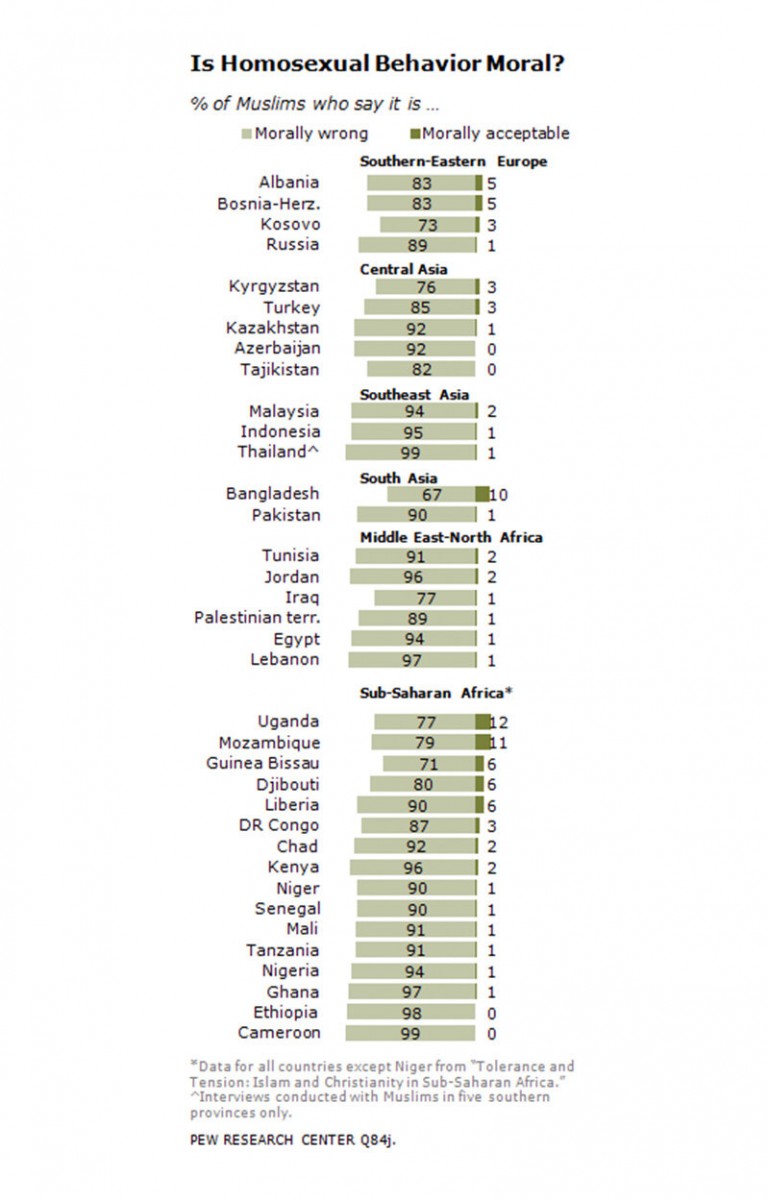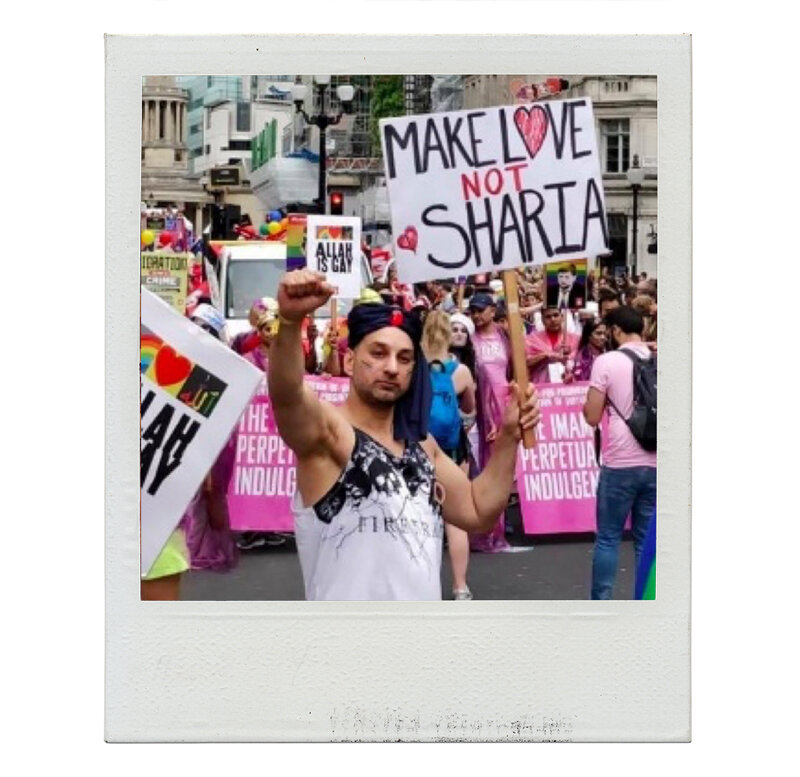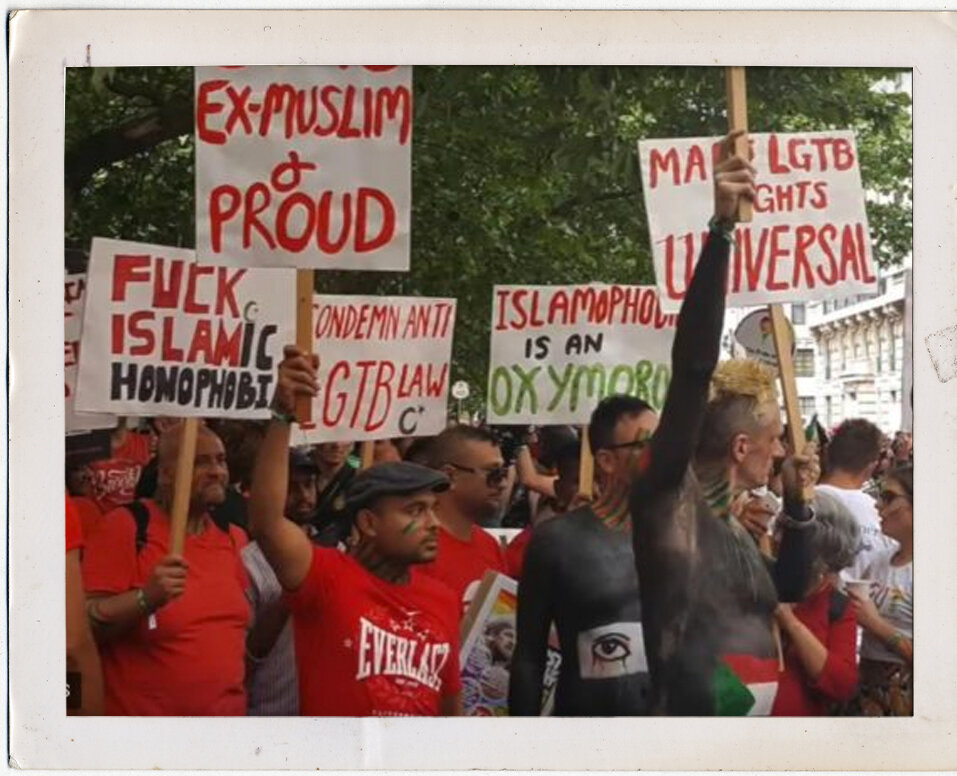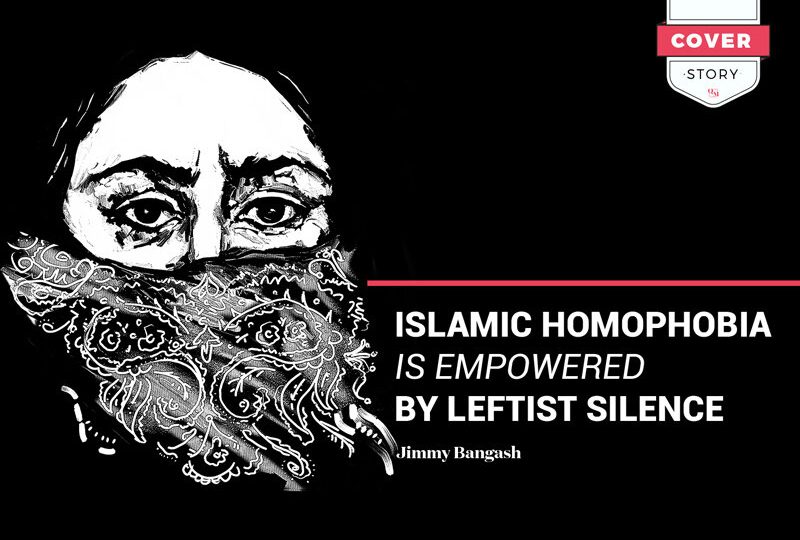Islamic Homophobia is Empowered by Leftist Silence, Queer Majority, 18 March 2021
In Muslim communities, homosexuality is intrinsically linked to anxiety, intimidation, violence, and, in some cases, death. For many, it involves living a closeted existence for fear of being ostracised or disowned. Islamic theological teachings, disseminated by religious institutions and espoused by community leaders, range from preaching for our execution to advising us to live a life of celibacy. Yet voices on the left, historically a stronghold of LGBTI support, do not sufficiently decry the abysmal treatment of gay and bi people of Muslim heritage, nor do they adequately mobilize against this specific and brutal form of homophobia.
This piece will scrutinize homophobia in the Muslim community and explore the left’s reluctance to criticize it in a consistent and productive manner. It will not explore the growth of the LGBTI Muslim movement which champions equality and representation of LGBTI individuals; rather it will focus on the dominant, wider Muslim community’s response to homosexuality.
Homophobia in the Muslim World
It is not a spurious exaggeration to claim homophobia is more widespread among Muslims than within other religious communities. Rather, statistically relevant polls of social attitudes consistently support the truth of these claims. This evidence provides a bleak picture, particularly when assessing attitudes in Muslim-Majority countries from which western diaspora communities originate.
A 2017 American poll found that 51% of Muslim respondents expressed support for marriage equality, an increased figure over previous years – yet 34% still opposed it. Media outlets disingenuously hailed this 51% as some type of success over Christianity, citing the figure to justify headlines such as “Majority of U.S. Muslims Now Support Gay Marriage, While White Evangelical Christians Remain Opposed.” Noteworthy in this attempt at obfuscation is the comparison between a conservative faction of Christians against a combined figure of liberal and conservative Muslims. In a more honest comparison between conservative Christians and Muslims, the data shows a far more damning portrayal of the conservative Muslim community.
Within Britain, where Muslims are more conservative than their US counterparts, the 2009 Gallup Coexist Index poll asked 500 Muslims if they believed homosexual acts were morally acceptable. 100% agreed that they were not, uniformly presenting homosexual acts as immoral. In the years since, there has been some positive traction around UK Muslims’ attitudes toward homosexuality; however, the picture remains oppressive. Most notably, a 2015 ICM poll found that 52% of British Muslims felt homosexuality should be illegal, with only 18% stating it should be legal. Equally damning was that 47% felt it was unacceptable for gay people to be allowed to work as teachers.
At an international level, the data around Islamic Homophobia is even more alarming. A 2013 PEW global study on Muslim Attitudes reported an almost unilateral condemnation of homosexuality in Muslim communities around the world. Countries expressing the highest acceptance of homosexuality among their Muslim population were Uganda (12%), Mozambique (11%), and Bangladesh (10%), with the other 37 countries, all Muslim-majority, polled showing less than 10%.
All 8 states or territories that mandate the death penalty for homosexuality are Muslim-majority. Among those that do not, many imprison people for being LGBT instead. All of these punishments are derived from mainstream interpretations of Sharia Law and Islamic Jurisprudence, which positions homosexuality as a major sin often equated to Sodomy and adultery. Where people are executed for the crime of being LGBT, the preferred methods of execution are public hanging or public stoning. Unsurprisingly, this international climate of execution and imprisonment encourages mob violence towards LGBT people.
In Brunei, where existing laws already made homosexuality punishable by imprisonment for up to 10 years, an attempt was made in 2019 to introduce the death penalty (by stoning) for convicted offenders despite a long-standing moratorium on executions for any crime. Justified by a new penal code that reflected a strict interpretation of Sharia Law, the policy led to a significant global outcry, which included boycotts and celebrity protests. The government of Brunei subsequently conceded to the international pressure, backtracking its position to clarify that the moratorium on the death penalty would extend to those convicted of “crimes” covered under the new legislation.
Pew Research picture:

Impact: Private Sphere
While an international contextualization of Islamic Homophobia is important, it would be erroneous to assume that its detrimental impact on LGBTI individuals takes place exclusively in faraway places such as Afghanistan and Iran. In the West, honor culture – a community mechanism of social control in which coercive tactics such as shunning, loss of community status, and shaming are utilized to pressure family members to take corrective action against those who do not conform to Islamic rules – often thrives within Muslim communities.
In 2017, Jahed Choudhury, a UK Muslim of Bangladeshi heritage, married his White partner in what was called “the first Muslim Gay wedding.” He was featured in the press with his husband and interviewed on national television. Some weeks later, he told a BBC interviewer that members of the Muslim community spat at him in the street. He also revealed that he was receiving hate comments on social media and described a specific message from someone in the community threatening to throw acid on him the next time they saw him. Choudhury then apologized to the Muslim community on national television for the offense of having married his same-sex partner so publicly. In other words, the threats of violence and intimidation were successful.
In 2017, Mahad Olad, a gay American ex-Muslim, was invited to travel to Kenya by his family, who are part of the Somali diaspora community. When they arrived, his mother confiscated Olad’s passport, and informed him that she was aware he was gay and that he had left Islam. In order to “save” him, she had decided to send him to Somali Sheikhs who would bring him back to Islam and make him straight. Only with the assistance of Ex-Muslims of North America was Olad able to escape his kidnappers and return to the USA.
In another 2017 incident, Siddika Reza, who was Secretary General of the Islamic faith organization NASIMCO (the Organization of North American Shia Ithna-Asheri Muslim Communities), attended the public, same-sex marriage of her son to his fiancé. After she shared pictures of the wedding on her social media account, more than 1000 members of the Shia Muslim community signed a petition calling for her to resign, on the grounds that her endorsement of her son’s marriage “goes against the legitimate majoritarian interpretations of Jaffari fiqh, which NASIMCO must uphold” – essentially, claiming that public endorsement of her son’s wedding was endorsement of sin and was therefore un-Islamic.
The result? Reza resigned from her post. The Muslim community’s social coercion was successful in censuring a member for being too accepting; in this case, it ensured that a mother’s acceptance of her son was suitably punished.
In 2019, Seran M (full name undisclosed), a Swiss 17-year-old of Iraqi heritage, awoke in bed with his father standing over him holding a knife and shouting, “Are you gay? Are you gay?” The father then proceeded to slit Seran’s throat. Fortunately, the teen was able to scramble over a balcony and obtain aid from his neighbours; he was put into an induced coma at a hospital and managed to survive.
While these overt displays of Islamic homophobia are reported by the media, it is imperative to understand how much remains hidden. Many LGBT people of Muslim heritage are forced to live closeted lifestyles to avoid facing these kinds of consequences, with some going as far as to have sham marriages in order to avoid detection. The controlling mechanism of honor culture often causes relatives to buckle under community pressure and disown their kin, tearing families apart and causing traumatic psychological repercussions for the victims.
Impact: Public Sphere
The influence of Islamic homophobia is not limited to the private domestic sphere. Its adherents’ ambitions are to ensure that LGBT rights do not achieve acceptance and that homosexuality is not normalized within wider society, driving them to take their charge into the public arena.
In 2019, Anderton Park School in Brimingham, UK, was the target of protest from members of the Birmingham Muslim community over a primary school education program named “No Outsiders,” as well as other material which they claimed furthered the “gay agenda.” Prior to a court injunction forcing relocation, the protest was held immediately outside the school gates, creating a frightening and intimidating environment for students inside. Videos can be found online of adults from the Birmingham Muslim community shouting “Shame! Shame! Shame!” through megaphones at the school gates, with children in their midst encouraged to chant along. Such deplorable conduct must have had a detrimental impact on any adolescent present who was coming to terms with their sexuality. These protests continued for approximately nine months and included the display of banners which read, “Adam and Eve, not Adam and Steve.”
In an effort to show support with a head teacher who had refused to cave to the pressure, LGBT individuals from Birmingham decided to go to the school and hang signs of solidarity, such as pictures of hearts and rainbows, on the school gates. They decided to do this at night so that they would not encounter the protesters and risk direct conflict. Unfortunately, they had not considered that it was Ramadan, and that the Muslim community would be awake late at night, eating before fasting again the next day. In video footage of the resulting confrontation, male members of the Muslim community can be seen creating a climate of fear and intimidation, shouting at LGBT people for coming into “our community.”
Eventually, some Muslim men began throwing eggs at the LGBT people, who then departed, shaken by the entire episode. Their symbols of support on the school gates were subsequently vandalized.
The protests, eventually, were permanently banned by the courts, but it is noteworthy that Anderton Park school suspended the teaching of the “No Outsiders” program for a significant period of time – a definite win for the forces that perpetuate Islamic Homophobia.
Betrayal by the Left
Given the data and visible detrimental impact, one would expect the left, which generally sees itself as a bastion of support for LGBT rights, to champion the challenge against Islamic homophobia. Regrettably, this is not the case. Consider the outcry we see when cake-baking Christians refuse business services to LGBT people; the widespread vocal condemnation from the left reaches across continents. Similarly, there is leftist public outcry around Christian conversion therapy, galvanizing an entire movement for its legislative prohibition. Such action is mobilized by LGBT organizations, political commentators, activists, human rights organizations and even celebrities, who use rhetoric in which the Christian faith is often lambasted, ridiculed, and positioned as archaic and irrelevant – yet no such outcry is forthcoming when Islamic homophobia rears its head. The left remains silent when, for example, Muslim clerics attempt to exorcize gay demons from members of the Muslim community.
As if the left’s silence was not detrimental enough to LGBT rights, its accusations of racism and Islamophobia towards those who seek to criticize Islamic homophobia are a blatant betrayal.
At the Birmingham school protests referenced above, the LGBT community decided to hold a counter protest after the courts had forced the Muslim protesters to move away from the school gates to a more distant location. A small contingent of people, predominantly White, and armed with guitars and rainbow flags, stood across the road from the Muslim protesters, strumming and singing along to love songs. Days later, in a national newspaper, Saima Razzaq, a local Muslim activist who describes herself as “queer,” stated that the actions of White LGBT counter protesters “reek[ed] of a colonial mindset.” Razzaq had been instrumental in the Birmingham community’s response to the homophobic protests, but instead of welcoming the support of white allies, she characterized them as “White saviours” and declared that “the answers have to come from within our community.”
The message was clear: you cannot champion LGBT rights in the UK if you are white and your homophobic opposition is non-White, and to do so renders you racist and neo-colonialist. It did not matter that those Muslims who were protesting LGBT education had made it clear that they wanted it stopped on a nationwide level in a White majority country. Only people of the same color and faith were permitted to lead this challenge. Universal human rights could no longer be fought for universally.

At the 2017 London Pride march, the Council of Ex-Muslims of Britain (CEMB) marched to challenge Islamic Homophobia – with particular focus on Chechnya, where reports of LGBT persecution and gay concentration camps had outraged the community. They carried banners listing the countries that mandated the death penalty for homosexuality, and held witty, provocative placards and signs poking fun at Islam. Near them, a separate contingent of Pride marchers held signs poking fun at Christianity. Pride, after all, had always been a safe place to criticize homophobia whether it was religious, political or cultural.
During the march, police descended on CEMB to tell them that their signs were offensive and requested they be put away. However, they did not accost the holders of signs mocking Christianity. CEMB declined the request and continued to march with their banners and signs.

Days later, the East London Mosque wrote a formal complaint to the Pride organization citing its objection to being named as a mosque which “incited murder and hatred of LGBT.” Imaan, a Muslim LGBT organization, issued a press release condemning the protest. Both organizations claimed the placards within the protest were Islamophobic and caused harm to Muslim people. Pride issued a statement to a national newspaper in which they said they would not tolerate Islamophobia, then suspended CEMB from marching in subsequent Pride marches pending an investigation. The investigation took 8 months, but in the end CEMB was cleared of the charges and eventually able to participate in the following year’s march without any restrictions.
Nevertheless, a message was communicated to the wider public that criticism of Islamic Homophobia is unacceptable. In this case it did not matter that some of the critics were Muslim and others Ex-Muslim. It did not matter that almost all the protesters were diaspora and refugees, individuals who had grown up and lived under Islam and were from Muslim families. It did not matter that many of them had fled countries and communities where imprisonment or death were the penalty for their sexuality. Any criticism of Islamic Homophobia was deemed Islamophobic (anti-Muslim) and racist.
In 2020, the iconic reality show “Ru Paul’s Drag Race” invited actor Jeff Goldblum to appear as a guest judge. The drag queen competitors walked a runway with the American “Stars and Stripes” as the theme. Iranian-Canadian contestant Jackie Cox wore a red-striped kaftan and a blue hijab outlined with 50 silver stars; she stated, “You can be Middle-Eastern, you can be Muslim, and you can still be American.”
Goldblum, prompted by the drag artist’s outfit, queried, “Is there something in this religion that is anti-homosexuality and anti-woman? Does that complicate the issue? I’m just raising it and thinking out loud and maybe being stupid.” Ru Paul responded that the presentation was complex, and that Drag had “always shaken the tree.”
Social and mainstream media erupted with condemnations of Goldblum’s comment, accusing him of racism and Islamophobia. His comments were labelled as dangerous. The Muslim Advocates organization issued a statement urging Goldblum to apologize; they claimed, “To not apologize for these comments is a silent endorsement of anti-Muslim bigotry.” In other words, yet another message of condemnation for those who seek to question Islamic Homophobia (as well as Islamic sexism in this case), and such questioning was characterized as being anti-Muslim.
There is a painful irony that cannot be missed in a gay man of Iranian heritage (Jacki Cox) wearing a hijab to symbolize Muslim women. Muslim women in Iran have long struggled against mandatory hijab and forced veiling laws. As movements such as White Wednesday have gained momentum in recent years, Iranian women are increasingly resisting and defying the hijab. Theocratic and misogynistic laws allow women to be punished for appearing in public with their hair showing. The BBC reports that 35 women have been arrested since 2017 in the capital city of Tehran alone. Some of these women reported being tortured and beaten.
While this betrayal by the left is abysmal, its attempt to police an audience’s response to Jacki’s art is nothing short of an Orwellian dystopia. Through his art, a drag performer was able to express his “misgivings” about the way LGBT people are treated in Muslim communities and provoke questions about the subject from his audience. Yet, the response from the left was to throw accusations of racism at that audience and eschew any useful dialogue around the real issue at hand. The message was again clear: even when presented with art by and about queer people of Muslim heritage, one may not scrutinize or question Islamic Homophobia. All dialogue around the subject must place Islam in a positive light; to do otherwise is anti-Muslim, Islamophobic, and racist.
Fortunately, Goldblum did not issue an apology – but neither has the Iranian government apologized for its Islamic- and Sharia- inspired execution of LGBT people. Iran still applies the death penalty for the “crime” of two people of the same sex loving each other. Muslim Advocacy group is quick to outrage over a scene on RuPaul’s Drag Race, but it does not appear to have written to the Iranian government to request an apology for state-sanctioned murder, nor has it declared the murder of gay and bi Muslim people in Iran to be anti-Muslim.
Islam is not a Race
The word Islamophobia is a deliberate conflation that blends criticism of an ideology (Islam) with criticism of a people (Muslims). This allows the silencing of any critics of Islam through the accusation of Islamophobia, which carries an inferred accusation of hatred against Muslims – something which would be far better described as Muslimophobia or anti-Muslim bigotry. Due to this conflation, the fear of being accused of Islamophobia makes individuals hesitant to highlight the abhorrent nature of Islamic homophobia, its theological roots, and the corresponding Islamic jurisprudence that results in the ongoing persecution of LGBT people.
Islam is a set of ideas in exactly the same way that Christianity, Capitalism, Communism and Hinduism are all sets of ideas. Ideas must be open to scrutiny, assessment and criticism. They must be open to satire and ridicule. Criticism of ideas leads to societal advancement, as can be seen in the widespread replacement of superstition with reason and the scientific method. Stifling criticism of Islam ultimately hurts Muslims and individuals of Muslim heritage; such censorship enables regressive and harmful practices (such as gay Islamic exorcisms in the UK) to continue, rather than to be scrutinized and stopped.
A majority of adherents to an ideology may be part of a particular racial demographic, whether in reality or in popular imagination. Criticism of that ideology is not, by default, a criticism of the racial demographic. If it were, one could argue that criticism of Capitalism is anti-white, criticism of Communism is anti-Chinese, and criticism of Hinduism is anti-South Asian/Indian. And it’s important to remember that in any case, Muslims are a very racially and ethnically diverse group.
Muslims are people and as such must be protected from bigotry. While all bigotry is unacceptable, we must acknowledge that using facts to highlight problematic beliefs and attitudes within the Muslim community is not bigotry – particularly when the facts themselves highlight rampant discrimination towards a sexual minority that is often in need of protection. Highlighting homophobic aggression and persecution is a responsibility that falls upon civil society, and that responsibility includes Islamic homophobia.
It is hypocritical of the left to allow consistent highlighting and condemnation of Christian homophobia and to position Christians (and, by presumed extension, white people) as robust, rational, critical thinkers able to withstand that criticism while characterizing Muslims as fragile “brown people” in need of protection from cognitive dissonance and critical thinking. This adherence to “Islamic fragility” is racist, paternalistic and patronizing.
Any focus on Islamic homophobia is inevitably challenged by the left with the question, “What about Christians?” It is perfectly acceptable to focus on one specific form of homophobia. In fact, it is essential that this be done, and in so doing it is appropriate to focus on the worst forms of homophobia. Attempting to address Islamic homophobia using an approach tailored to Christian homophobia, or a model designed for tackling homophobia in China, will miss many of the nuances particular to the Islamic faith. It will also be rendered meaningless for a Muslim audience who, by and large, consider Christianity or atheism to be erroneous or even heresy.
A specific focus on Islamic Homophobia allows focused compilation and assessment of data, theology, history, and attitudes. This then leads to specific suggestions for solutions, resource allocation, accountability and timelines for improvement. In order to plan specific remedial measures, we must look at the specific issue.
We must not be silenced by accusations of Islamophobia or racism in our efforts to eradicate the most pernicious form of homophobia that currently persecutes LGBT people across the globe. Rather, we must stand resolute and increase our scrutiny of Islamic homophobia, holding it and the Muslim community to the same standards to which we hold the rest of society. To do anything less is the bigotry of low expectations, and a racist double standard.

